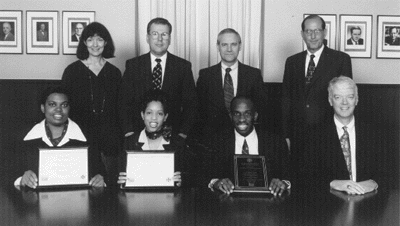|
|
MPH Students Take Top Spot in Health Care CompetitionBy Rod GrahamSchool of Public Health |

Winning the recent fourth annual Everett V. Fox Student Case Analysis and Presentation Competition in Lake Buena Vista, Fla., was a heady experience for three students from the School of Public Health--not least because they had prevailed in a field composed mainly of students with business and health administration degrees.
"We three, with our MPHs, put together the best plan the judges heard, even though we're not classically trained in health care management," says Stephen Nurse-Findlay, a fourth-year medical student at the School of Medicine and captain of the team, which also included Renata Arrington and Nneke Egbuniwe.
Not only was Hopkins the only school of public health to participate, but the School of Public Health had never before participated in this event, and Nurse-Findlay and Arrington accounted for two of only three medical students competing.
 |
| Seated: MPH students Renata Arrington, Nneke Egbuniwe and Stephen Nurse-Findlay, winners of the Everett V. Fox Student Case Analysis and Presentation Competition; and William Ward Jr., associate scientist, one of their advisers. Other advisers, standing: Laura Morlock, professor; Herbert Hansen Jr., senior associate dean for finance and administration; Alan Lyles, assistant professor; and Dean Alfred Sommer. Not pictured: John Ellis, adjunct professor and executive vice president for finance at St. Joseph's Hospital. |
The national competition was sponsored by the National Association of Health Services Executives, a nonprofit professional association dedicated to the advancement and development of African American policy-makers in health care. The event is meant to give first- and second-year minority graduate students of health care administration a chance to show off their problem-solving and presentation skills. This year, the student teams were asked to develop strategic recommendations that would enable Kaiser Permanente's mid-Atlantic states region to improve its services, empower its employees and enhance its market share.
Although the case study is divulged to participants three weeks before the contest takes place, the winning Hopkins team actually had only two weeks to prepare because one of the original team members had to drop out, leaving a gap filled on short notice by Egbuniwe, a second-year law student at Georgetown University Law School. But in those two weeks, the reconstituted team produced a 50-page document and began practicing its presentation in front of its advisers, a group of Health Policy and Management faculty that included William J. Ward Jr., associate scientist; Laura Morlock, professor; Alan Lyles, assistant professor; and John Ellis, adjunct professor and executive vice president for finance at St. Joseph's Hospital of Baltimore.
The team members divided up the tasks according to their fields of interest. Nurse-Findlay, passionately concerned with the nuts and bolts of health care finance, took responsibility for the presentation's financial statement and for plotting how Kaiser Permanente could double its mid-Atlantic patient enrollment. Egbuniwe, interested in health policy and the legal aspects of health care, worked on an employee empowerment program and a legislative agenda for Capitol Hill. Arrington has experience in improving the health climate of East Baltimore as a community coordinator and has been involved at Hopkins in clinical quality and patient outcomes measurement; she worked on recommendations to improve clinical quality and patient satisfaction.
Arriving in Florida the night before the preliminaries, the three immediately went to see the room where they would make their presentation and realized they had problems. In order to use the microphone, presenters had to step up to the podium one by one, but the Hopkins students had scripted their presentation as an interactive team effort. Also, "anyone standing by the projector would have blocked the judges' view," Nurse-Findlay remembers.
That night, they procured some hand-held mikes and rearranged the room. Then they practiced their performance into the wee hours. Next day, they breezed through the 15 team preliminaries as one of six schools selected for the final round. The finals took place two days later.
What did the three tell the senior leadership of Kaiser Permanente, particularly about its aspirations of signing up a half million new patients in the mid-Atlantic region? "One thing we wanted to get across," Arrington says, "is that we weren't so concerned with the bottom line. We passionately believed that we needed to focus our efforts on making sure every aspect of our health plan reflected Kaiser's mission and vision and that, if we built it right, then the ultimate measure of success--the smile of the millionth member--would be met."
"In other words," Egbuniwe says, "clean up your own house before you invite someone else in--improve services and increase both patient and employee satisfaction--and the growth will naturally follow."
"I'm very glad I did my MPH in health policy, finance and management," Nurse-Findlay says. "Unless a doctor today understands the realities of the $1.3 trillion health care industry, the practice of medicine will become even more reactive instead of more proactive. I wanted to understand the corporate aspects of medicine without sacrificing my clinical or public health perspective."
Egbuniwe believes it crucial that more African Americans get trained as policymakers. "Even if more and more minority physicians are trained, if those providers are working within a system designed without the input of minority policy-makers, health care won't meet the needs of minority communities."
Arrington, who will pursue a career in internal medicine-pediatrics, hopes to change the fundamental practice of health care in this country by helping hospitals, health plans and providers to combine quality and cost-effective research with community-based medicine. "In this way, we will be able to say that what we're doing as physicians is effective, while simultaneously making people's lives better."
| GO TO JUNE 21, 1999 TABLE OF CONTENTS. |
| GO TO THE GAZETTE HOMEPAGE. |